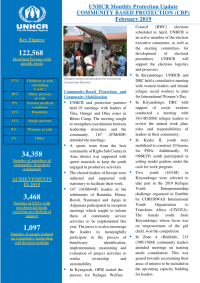23 Apr 2019 UNHCR Uganda: Community-Based Protection Thematic Report (February 2019) Reportfrom UN High Commissioner for Refugees Published on 28 Feb 2019 — View Original 
 Download PDF (555.97 KB)
Download PDF (555.97 KB)
Key Figures
- 122,568 Identified Persons with specific needs: 37% Children at risk (including UASC), 20% Older persons at risk, 9% Serious medical condition, 13% Disability, 11% Single parents, 8% Woman at risk, 2% Other – 34,358 Number of members of community structures (estimated)
ACHIEVEMENTS IN 2019
- 3,468 Number of POCs with psychosocial needs receiving psychological support
- 1,097 Number of people trained on community leadership and decision making
Community-Based Protection and Community Mobilization
- UNHCR and protection partners held 03 meetings with leaders of Tika, Omugo and Ofua zones in Rhino Camp. The meeting sought to strengthen coordination between leadership structures and the community. 167 (87M/80F) attended the meetings.
- A sports team from the host community of Rigbo Sub County in Arua district was supported with sports materials to keep the youth engaged in productive activities.
- The elected leaders of Imvepi were inducted and supported with stationery to facilitate their work.
- 147 (103M/44F) leaders in the settlements of Baratuku, Elema, Boroli, Nyumanzi and Agojo in Adjumani participated in inception meetings which sought to inform them of community service activities to be implemented this year. The move is to also encourage the leaders to meaningfully participate in the process of beneficiary identification, implementation, monitoring and evaluation of project activities to realise ownership and sustainability.
- In Kyangwali, OPM started the process for Refugee Welfare Council (RWC) elections scheduled in April. UNHCR is an active member of the election executive committee, as well as the steering committees for development of electoral procedures. UNHCR will support the elections logistics and processes.
- In Kiryandongo, UNHCR and DRC held a consultative meeting with women leaders and female refugee social workers to plan for International Women’s Day.
- In Kiryandongo, DRC with support of social workers conducted a meeting with 34(14F/20M) refugee leaders to review the annual work plan, roles and responsibilities of leaders in their community.
- In Kyaka II, youth were mobilized to construct 10 houses for PSNs. Additionally, 92 (90M/2F) youth participated in setting model gardens under the cash for work program.
- Two youth (1F/1M) in Kiryandongo were selected to take part in the 2019 Refugee Youth Entrepreneurship challenge organized in Entebbe by COBURWAS International Youth Organization to Transform Africa (CIYOTA). The female youth from Kiryandongo, whose focus was on empowerment of the girl child, won the competition.
- In Zone 4 (Bidibidi), 215 (39F/176M) community leaders attended meetings on training needs consultation. This was geared towards ascertaining their areas of interest to be included in the upcoming capacity building for leaders.
- In Bidibidi, 154 (43F/111M) community leaders were trained on livelihood and VSLA skills, group management. The leaders have started saving cash for their welfare. This has enhanced team spirit and sustainability for the structures.
- Two meetings were conducted with the Nuer youths group in Zone 4 Village 5 of Bidibidi, attended by 234 (155F/79M) persons. Issues of concern included inclusion in leadership structures, restricting alcohol brewing in the villages, engagement of religious leaders in peaceful engagement dialogues.
- In Bidibidi, 41(3F/38M) community leaders were supported with stationery to support the functions of the structures. Additionally, 18 bicycles were distributed to cluster leaders and chairpersons RWC3 in Zone1 to 4 to facilitate movement in monitoring and mobilisation of community.
Further, 138 (F4/M134) RWC 1 – 3 leaders were provided with airtime to facilitate coordination across the Zones.

Primary country
Uganda
-
Content format:
- Situation Report
-
Language:
- English
-
Theme:
- Food and Nutrition
- Health
- Logistics and Telecommunications
- Peacekeeping and Peacebuilding
- Protection and Human Rights
-
Vulnerable groups:
- Children
- Persons with Disabilities
- Refugees
- Women




